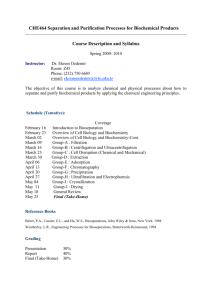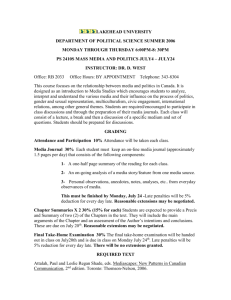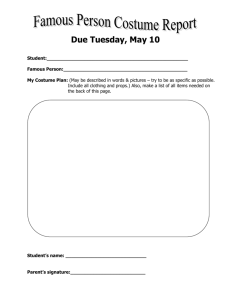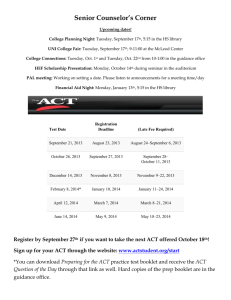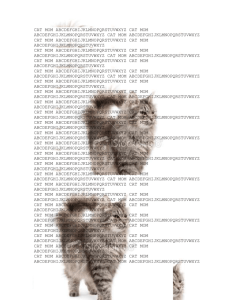english 114 - Center for Literary Computing
advertisement
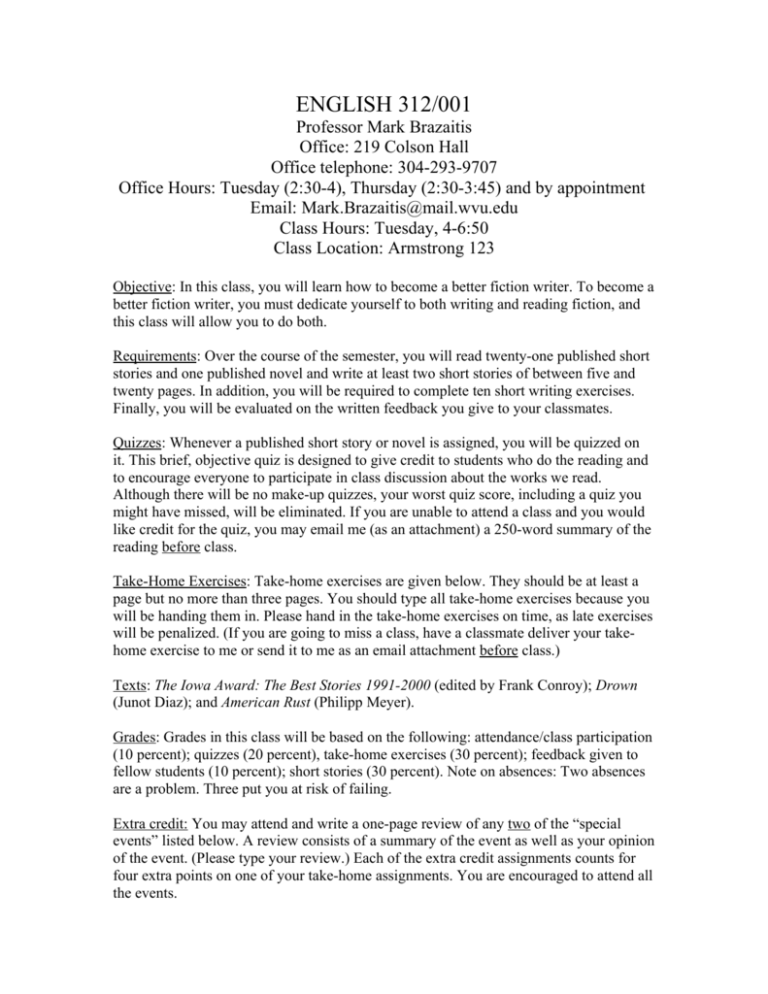
ENGLISH 312/001 Professor Mark Brazaitis Office: 219 Colson Hall Office telephone: 304-293-9707 Office Hours: Tuesday (2:30-4), Thursday (2:30-3:45) and by appointment Email: Mark.Brazaitis@mail.wvu.edu Class Hours: Tuesday, 4-6:50 Class Location: Armstrong 123 Objective: In this class, you will learn how to become a better fiction writer. To become a better fiction writer, you must dedicate yourself to both writing and reading fiction, and this class will allow you to do both. Requirements: Over the course of the semester, you will read twenty-one published short stories and one published novel and write at least two short stories of between five and twenty pages. In addition, you will be required to complete ten short writing exercises. Finally, you will be evaluated on the written feedback you give to your classmates. Quizzes: Whenever a published short story or novel is assigned, you will be quizzed on it. This brief, objective quiz is designed to give credit to students who do the reading and to encourage everyone to participate in class discussion about the works we read. Although there will be no make-up quizzes, your worst quiz score, including a quiz you might have missed, will be eliminated. If you are unable to attend a class and you would like credit for the quiz, you may email me (as an attachment) a 250-word summary of the reading before class. Take-Home Exercises: Take-home exercises are given below. They should be at least a page but no more than three pages. You should type all take-home exercises because you will be handing them in. Please hand in the take-home exercises on time, as late exercises will be penalized. (If you are going to miss a class, have a classmate deliver your takehome exercise to me or send it to me as an email attachment before class.) Texts: The Iowa Award: The Best Stories 1991-2000 (edited by Frank Conroy); Drown (Junot Diaz); and American Rust (Philipp Meyer). Grades: Grades in this class will be based on the following: attendance/class participation (10 percent); quizzes (20 percent), take-home exercises (30 percent); feedback given to fellow students (10 percent); short stories (30 percent). Note on absences: Two absences are a problem. Three put you at risk of failing. Extra credit: You may attend and write a one-page review of any two of the “special events” listed below. A review consists of a summary of the event as well as your opinion of the event. (Please type your review.) Each of the extra credit assignments counts for four extra points on one of your take-home assignments. You are encouraged to attend all the events. Note on your writing: You are expected to produce quality literary writing. Please, no genre writing (science fiction, romance, horror, fantasy). The world you create in your fiction doesn’t necessarily have to be but your characters must be human (or anthropomorphic) and complex. Class Schedule and Day-to-Day Assignments Tuesday, January 11 Get acquainted. Tuesday, January 18 Read: “The World With My Mother Still in It” (page 38) and “Nothing” (page 59) in The Iowa Award. Workshop of stories. Tuesday, January 25 Read: “Hints of His Mortality” (page 1) in The Iowa Award and “Ysrael” (page 3) in Drown. Due: Take-home exercise: Write about a fight (either physical or verbal) between two characters. Workshop of stories Tuesday, February 1 Read: “House Fires” (page 212) in The Iowa Award and “Fiesta, 1980” (page 23) in Drown. Due: Take-home exercise: Write a description of a paradise that becomes a hell. (The place doesn’t have to change at all. A character’s reaction to the place might change.) Workshop of stories Tuesday, February 8 Read: “Where Love Leaves Us” (page 101) in The Iowa Award and “Aurora” (page 47) in Drown. Due: Take-home exercise: Write a scene in which two characters with seemingly nothing in common fall in love. Workshop of stories. Special Event: February 10: A reading by creative nonfiction writers Kevin Oderman and Erin Tocknell, Robinson Reading Room, WVU Library, 7:30 p.m. Tuesday, February 15 Read: “Ambulance” (page 120) in The Iowa Award and “Aguantando” (page 69) in Drown. Due: Take-home exercise: Write about a dramatic occurrence such as a bank robbery, a murder, a fire, or anything else you can think of. Or: Write about nothing much (but make it interesting). Workshop of stories. Tuesday, February 22 Read: “The End of Romance” (page 128) in The Iowa Award and “Drown” (page 91) in Drown. Due: Take-home exercise: Write a scene in which a character is obsessed with someone famous. Workshop of stories. Tuesday, March 1 Read: “Igloo Among Palms” (page 146) in The Iowa Award and “Boyfriend” (page 111) in Drown. Due: Take-home exercise: Write a scene in which a character confronts what appears to be a ghost or a supernatural being. Workshop of stories. Special Event: March 7: A reading by creative nonfiction writer Randall Kenan in the Gold Ballroom of the Mountainlair, 7:30 p.m. Tuesday, March 8 Read: “Out of the Girls’ Room and into the Night” (page 166) in The Iowa Award and “Edison, New Jersey” (page 121) in Drown. Due: Take-home exercise: Write a scene set in a high school. Workshop of stories. Tuesday, March 15 Read: “The Oracle” (page 192) in The Iowa Award and “How to Date a Brown Girl...” (page 145) in Drown. Due: Take-home exercise: Write a scene involving a romantic couple of whom society and/or their friends and family disapproves. Workshop of stories. March 19 to March 27 Spring Recess – Enjoy! Tuesday, March 29 Read: “No Face” (page 153) and “Negocios” (pages 163) in Drown. Due: Take-home exercise: Write a scene featuring an outcast from society. Workshop of stories. Tuesday, April 5 Read: Pages 1-129 of American Rust. Due: Take-home exercise: Revise one of your take-home assignments. Hand in both the first draft and your revision. Workshop of stories. Tuesday, April 12 Read: Pages 130 to 243 of American Rust. Workshop of stories. Tuesday, April 19 Read: Pages 244 to the end of American Rust. Workshop of stories. Special Event: April 21: Reading by students published in Calliope, WVU’s undergraduate literary magazine, 130 Colson Hall, 7:30 p.m. Tuesday, April 26 Workshop of stories. Special Event: April 28: A reading by graduating MFA in Creative Writing students, Rhododendron Room, Mountainlair, 7:30 p.m. *** Core Values/Social Justice at West Virginia University The following core values establish the foundation for Social Justice at West Virginia University. Every person has intrinsic worth and dignity; Respect for the law is fundamental; Freedom from fear is universal; A climate of opportunity, mutual respect, and understanding engenders a feeling that the future should be shared by all community members; There is an absence of discrimination and harassment based on age, color, disability, ethnic origin, marital status, pregnancy, race, religious beliefs, sex, sexual orientation, and veteran status; and The rich diversity of people, their cultures, and the bonds that tie people together are appreciated and celebrated.

